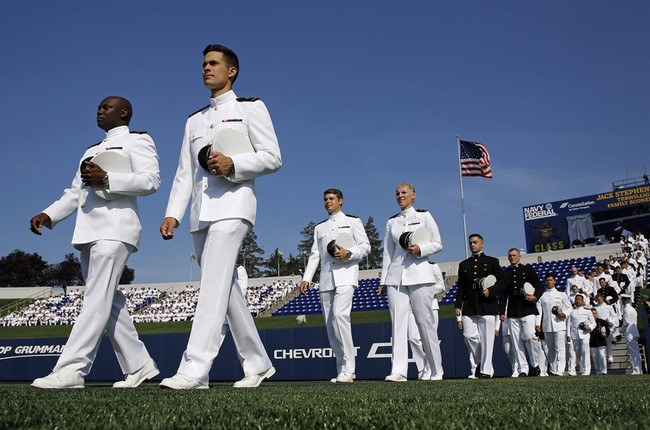We support our Publishers and Content Creators. You can view this story on their website by CLICKING HERE.

A federal judge ruled on Friday that the U.S. Naval Academy can continue considering race in its admissions process, ruling that military cohesion and other national security factors mean the officer training school should not be subjected to the same standards as civilian universities.
Advertisement
As reported by The New York Times on Friday, attorneys for the Academy argued during a two-week bench trial in September that prioritizing diversity in the military makes it stronger, more effective, and more widely respected.
The decision was a setback for Students for Fair Admissions (SFA), an activist group that believes “racial classifications and preferences in college admissions are unfair, unnecessary, and unconstitutional” (emphasis, mine):
Our mission is to support and participate in litigation that will restore the original principles of our nation’s civil rights movement: A student’s race and ethnicity should not be factors that either harm or help that student to gain admission to a competitive university.
SFA has sought to extend its successful challenge to “race-conscious admissions” at civilian schools to the nation’s military academies. In the group’s cases against Harvard College and the University of North Carolina, the Supreme Court in 2023 decided that race-based admissions violated the Equal Protection Clause of the 14th Amendment.
Here’s more:
The high court’s conservative majority broadly prohibited the consideration of race and ethnicity in college admissions, ending a longstanding practice meant to boost opportunities for historically marginalized groups and sending shockwaves through higher education. But it carved out a potential exemption for military academies, suggesting that national security interests could affect the legal analysis.
Students for Fair Admissions later sued the Annapolis-based Naval Academy challenging the exemption.
But Judge Richard Bennett rejected their arguments in a lengthy opinion released Friday. A George W. Bush appointee who served for over 20 years in the U.S. Army Reserve and the Maryland National Guard, Bennett wrote that the school had “established a compelling national security interest in a diverse officer corps.”
Advertisement
Judge Bennett further wrote:
Specifically, the Academy has tied its use of race to the realization of an officer corps that represents the country it protects and the people it leads. The Academy has proven that this national security interest is indeed measurable and that its admissions program is narrowly tailored to meet that interest.
The judge noted that demographics are a minor factor in Naval Academy admissions; that no one is admitted solely on the basis of race. He also wrote that Students for Fair Admissions includes among its membership “four individuals whose prior applications to the U.S. Naval Academy were denied.”
Attorneys for SFA argued during the trial that prioritizing minority candidates is unfair to qualified white applicants and that cohesion should arise from other factors such as training and command structure.
Amen.
Witness testimony included accounts from current and former high-ranking military officials who expressed varying opinions on how race affects the experiences of service members and the military as a whole. Some argued that performance standards alone should be used to evaluate candidates, while others emphasized the importance of fostering diversity.
Amen, again.
Attorneys for the Naval Academy wrote in court papers that the school’s process considers multiple factors in its admissions process, including grades, extracurricular activities, life experience, and socioeconomic status, and that race is taken into account in a “limited fashion.”
Advertisement
ALSO READ:
Buzz Cut: What Do You Want Our Military to Be?
Pentagon Generals Freak Out, Scramble to Hide Evidence of DEI Advocacy
I’m not a military expert, but if I were building a fighting force (or starting a business), I’d first rely on performance standards to evaluate candidates vs. prioritizing diversity or “equity.”
Period.

 Conservative
Conservative  Search
Search Trending
Trending Current News
Current News 





